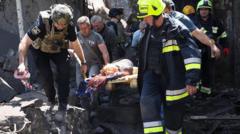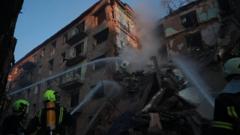As NATO leaders convene in The Hague, German Chancellor Friedrich Merz emphasizes the necessity of a unified defense strategy against threats from Russia, declaring Germany's commitment to contribute fairly to European defense efforts.
Germany's Commitment to European Defense Strengthens Amidst Tensions at NATO Summit

Germany's Commitment to European Defense Strengthens Amidst Tensions at NATO Summit
Germany pledges increased defense spending as NATO leaders gather amidst global security challenges.
In a pivotal announcement ahead of the NATO summit in The Hague, German Chancellor Friedrich Merz underscored that Germany would provide its "fair share" to bolster European defense as tensions with Russia continue to escalate. Merz expressed that Russian President Vladimir Putin only comprehends the "language of force," and called for a renewed commitment to ensure long-lasting peace in Europe. This gathering marks US President Donald Trump's first participation in a NATO summit since 2019, where all 32 leaders are anticipated to agree on a collective defense spending target of 3.5% of national GDP, accompanied by an additional 1.5% dedicated to related military infrastructure.
In a context heavily influenced by the ongoing Israel-Iran conflict, NATO Secretary General Mark Rutte urged European allies to place their focus on enhancing defense investments and aiding Ukraine amid persistent Russian aggression. He reassured allies of the unwavering commitment from the U.S. leadership towards NATO, tied closely to matching American military spendings.
Notably, this summit has come in the wake of recent Russian missile strikes in Ukraine, claiming the lives of 11 individuals, with numerous others injured. The German Chancellor has reported that diplomatic efforts have yet to prompt Russia to engage in negotiations. Amidst these developments, Ukrainian President Volodymyr Zelensky is scheduled to meet with Trump, marking their first encounter since Pope Francis's funeral in April.
In an effort to address the shifting dynamics in defense funding, NATO member states are expected to endorse a major investment plan, setting the new benchmark for defense spending at 5% of GDP — a significant increase from the current guidelines. Many allied nations remain far from this target, though the German government has reached a budget agreement projected to ensure they meet the 3.5% spending goal by 2029, with defense allocations anticipated to rise significantly in the coming years.
Merz reiterated Germany's commitment to this increase not as merely fulfilling U.S. expectations, but as a commitment rooted in their own national security interests against the backdrop of an aggressive Russia endangering the Euro-Atlantic stability. During the summit, discussions are set to include personal meetings between Merz and leaders such as UK Prime Minister Sir Keir Starmer and French President Emmanuel Macron.
The drive towards a 5% defense target, initiated by Trump's administration, has faced skepticism and resistance from several member nations, particularly from Spain. Spanish Prime Minister Pedro Sánchez has sought exemptions from the enhanced spending targets, arguing the impracticality of doubling Spain's defense budget, a move resisted by NATO officials keen on firm commitments from all allies.
Despite disagreements, it is anticipated that a unified pledge will materialize from this summit, aligning all 32 nations toward enhanced collective defense strategies. As security concerns echoed throughout the summit, transport disruptions caused by suspected sabotage near The Hague served as a stark reminder of the vulnerabilities that NATO aims to address in this historic assembly.





















